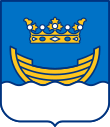
Helsinki is the capital and most populous city in Finland. It is on the shore of the Gulf of Finland and is the seat of southern Finland's Uusimaa region. About 675,000 people live in the municipality, with 1.25 million in the capital region and 1.58 million in the metropolitan area. As the most populous urban area in Finland, it is the country's most significant centre for politics, education, finance, culture, and research. Helsinki is 80 kilometres (50 mi) north of Tallinn, Estonia, 360 kilometres (220 mi) north of Riga, Latvia, 400 kilometres (250 mi) east of Stockholm, Sweden, and 300 kilometres (190 mi) west of Saint Petersburg, Russia. Helsinki has significant historical connections with these four cities.

A pride parade is an event celebrating lesbian, gay, bisexual, and transgender (LGBTQ) social and self-acceptance, achievements, legal rights, and pride. The events sometimes also serve as demonstrations for legal rights such as same-sex marriage. Most occur annually throughout the Western world, while some take place every June to commemorate the 1969 Stonewall riots in New York City, which was a pivotal moment in modern LGBT social movements. The parades seek to create community and honor the history of the movement. In 1970, pride and protest marches were held in Chicago, New York City, Los Angeles, and San Francisco around the first anniversary of Stonewall. The events became annual and grew internationally. In 2019, New York and the world celebrated the largest international Pride celebration in history: Stonewall 50 - WorldPride NYC 2019, commemorating the 50th anniversary of the Stonewall Riots, with five million attending in Manhattan alone. Pride parades occur in urban locations worldwide, incl. cities or urban areas in Argentina, Australia, Brazil, Canada, Chile, Denmark, Finland, France, Israel, Japan, Mexico and the United States.

LGBTI Rights in Finland Seta, founded in 1974, is the main LGBT rights organisation in Finland. It is a national organization with several member organizations around the country. Seta´s secretary general is Kerttu Tarjamo and chairperson Pekka Rantala. The 11th President of Finland, Tarja Halonen, was the chairwoman of Seta 1980–1981.

Senate Square presents Carl Ludvig Engel's architecture as a unique allegory of political, religious, scientific and commercial powers in the centre of Helsinki, Finland.
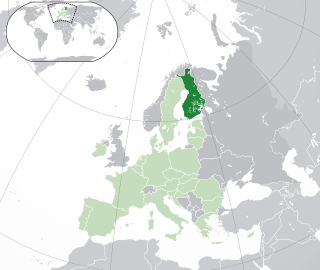
Lesbian, gay, bisexual, and transgender (LGBT) rights in Finland are among the most advanced in the world. Both male and female same-sex sexual activity have been legal in Finland since 1971 with "promotion" thereof decriminalized and the age of consent equalized in 1999. Homosexuality was declassified as an illness in 1981. Discrimination based on sexual orientation in areas such as employment, the provision of goods and services, etc., was criminalized in 1995 and discrimination based on gender identity in 2005.

The Chicago Pride Parade, also colloquially called the Chicago Gay Pride Parade or PRIDE Chicago, is an annual pride parade held on the last Sunday of June in Chicago, Illinois in the United States. It is considered a culmination of the larger Gay and Lesbian Pride Month in Chicago, as promulgated by the Chicago City Council and Mayor of Chicago. Chicago's Pride Parade is one of the largest by attendance in the world. The event takes place outside and celebrates equal rights for lesbian, gay, bisexual, transgender and queer people, which is also known as the celebration of LGBTQ rights.

The Houston Gay Pride Parade is the major feature of a gay pride festival held annually since 1979. The festival takes place in June to celebrate the lesbian, gay, bisexual, and transgender people and their allies. This event commemorates the 1969 police raid of the Stonewall Inn on Christopher Street in New York City's Greenwich Village neighborhood, which is generally considered to be the beginning of the modern gay rights movement. Protests against police harassment in Houston also helped bring about the parade.
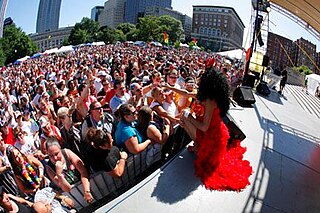
Indy Pride Festival is the annual week of LGBT pride events in Indianapolis. The week is organized by LGBTQ organization Indy Pride, Inc., and has been held under this name and organization for over a decade. In recent years, more than 95,000 gay, lesbian, bisexual, transgender and heterosexual people have attended the festival. Indy Pride's Parade and Festival is held the 2nd Saturday in June, with a week of events leading up to it, in honor of the Stonewall Riots and in accordance with other United States pride festivals. Indy Pride Festival is the largest LGBT pride event in Indiana.

Budapest Pride, or Budapest Pride Film and Cultural Festival, is Hungary's largest annual LGBTQ event. Of the week-long festival, the march is the most visible event. The march has historically been known under several names, including Budapest Gay Dignity Procession, and has taken place each year since 1997, usually on the first Saturday of July, proceeding along Budapest's most expansive thoroughfare, Andrássy Avenue, between the City Park (Városliget) and Elizabeth Square. Though much smaller in scale than similar gay pride parades in Western Europe and the Americas, around one to two thousand marchers typically participate in the Budapest procession. Radical right-wing demonstrators and hooligans have severely disrupted the Budapest Pride marches held in 2007 and 2008, casting uncertainty over the future of the event. However, Budapest Pride has been held successfully in the intervening years, with minimal incidents.

The Dublin LGBTQ+ Pride Festival is an annual series of events which celebrates lesbian, gay, bisexual, transgender, queer (LGBTQ+) life in Dublin, Ireland. It is the largest LGBTQ+ pride festival on the island of Ireland. The festival culminates in a pride parade which is held annually on the last Saturday in June. The event has grown from a one-day event in 1974 to a ten-day festival celebrating LGBT culture in Ireland with an expanded arts, social and cultural content.
This article is about lesbian, gay, bisexual and transgender (LGBT) history in Finland.

Istanbul Pride is a pride parade and LGBTQ demonstration held annually in Turkey's biggest city, Istanbul since 2003. Participants assemble in Taksim Square before marching the entire length of İstiklal Avenue. It has been described as the first and biggest LGBT event in Muslim-majority countries.
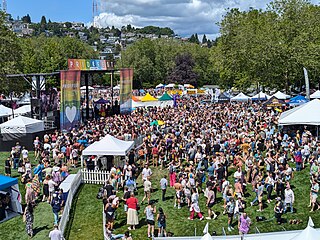
Seattle Pride refers to a series of events which are held annually throughout the month of June to celebrate LGBT Pride in Seattle, Washington. Seattle Pride also refers to the nonprofit organization Seattle Out and Proud which coordinates and promotes LGBTQIA+ events and programs in Seattle year-round including the Seattle Pride Parade.
Queen City Pride is an LGBT pride festival, held annually in Regina, Saskatchewan, Canada. The event is held mid-June each year, normally in the week following Saskatoon Pride. The festival is administered by Regina Pride Inc., a non-profit corporation in the province of Saskatchewan.

The Edmonton Pride Festival is a 2SLGBTQ+ pride festival, held annually in Edmonton, Alberta, Canada.

The Milano Pride is a parade held at the end of June each year in Milan, Italy, to celebrate the lesbian, gay, bisexual, transgender, asexual, intersexual and queer (LGBTQ+) people and their allies. Until 2012, the event has been held each year but with a different name. Milano Pride is one of the largest gay and lesbian organized events in Italy. Its aim is to demonstrate for equal rights and equal treatment for LGBT people, as well as celebrate the pride in Gay and Lesbian Culture.
Vienna Pride is a celebration that takes place in the Austrian capital every year in support of equality for lesbian, gay, bisexual and transgender (LGBTQ) people. It includes the Austrian pride parade, the Rainbow Parade which takes place on the Vienna Ring Road, (Ringstraße), at the end of the festival.
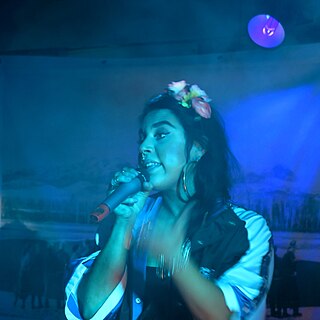
Sápmi Pride is a pride festival with Sápmi focus arranged annually since 2014.
Vastaamo was a Finnish private psychotherapy service provider founded in 2008. On 21 October 2020, Vastaamo announced that its patient database had been hacked. Private information obtained by the perpetrators was used in an attempt to extort Vastaamo and, later, its clients. The extorters demanded 40 bitcoins, roughly worth 450,000 euros at the time, and threatened to publish the records if the ransom was not paid. To add pressure to their demands, the extorters published hundreds of patient records a day on a Tor message board.



















